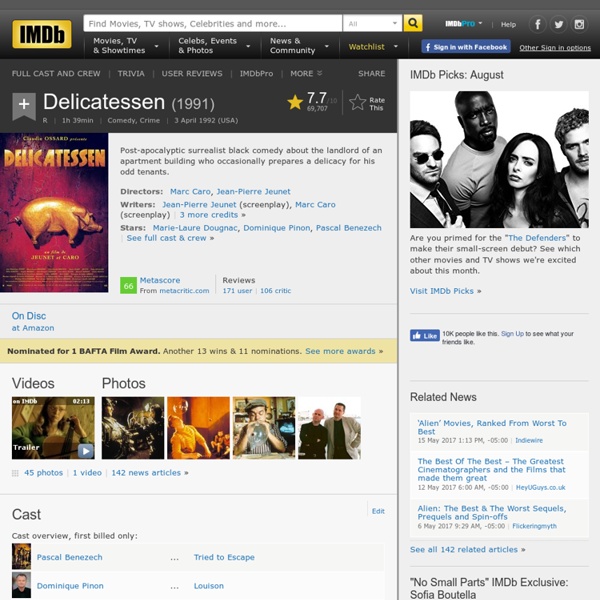



L’AGENCE, avec Matt Damon et Emily Blunt : nouveau poster L’AGENCE, avec Matt Damon et Emily Blunt : nouveau poster Après des affiches dignes d’Hitchcock, voici le nouveau poster de L’AGENCE. Basé sur une nouvelle de Philip K. Dick, L’AGENCE déroule l’histoire de David Norris, requin de la politique souffrant d’une tendance certaine à autodétruire ses chances électorales. L’AGENCE, dirigé par George Nolfi (scénariste de LA VENGEANCE DANS LA PEAU), sortira le 23 mars prochain en France. Sa nouvelle affiche, révélée par Universal, n’est pas pour le marché hexagonal, mais elle est suffisamment jolie pour que nous la partagions.
Cinema of Germany The Cinema of Germany refers to the film industry based in Germany and can be traced back to the late 19th century. German cinema has made major technical and artistic contributions to film during the period from 1918-1933. Unlike other national cinemas, which developed in the context of relatively continuous and stable political systems, Germany witnessed major changes to its identity during the 20th century. 1895–1918 German Empire[edit] The history of cinema in Germany can be traced back to the years shortly after the medium's birth. In its earliest days, the cinematograph was perceived as an attraction for upper class audiences, but the novelty of moving pictures did not last long. The Babelsberg Studio near Berlin was the first large-scale film studio in the world (founded 1912) and the forerunner to Hollywood. Cinemas themselves began to be established landmarks in the years immediately before World War I. Prior to 1914, however, many foreign films were imported.
Ed Wood (1994 Raras Fotos de Star Wars corcholat Suscríbete Raras Fotos de Star Wars — Publicado por fael hace 4 años, 3 meses Fuentes: damncoolpics.blogspot.comvanityfair.comnews.ycombinator.com Suscríbete gratis a la lista de correo Relacionados corcholat 2007 - 2014corcholat [at] gmail [dot] com→ therror.com The 400 Blows (1959) A Few Good Men (1992 Family - The Marx Brothers On the image above please click on the brother you would like more information about or scroll down to get general information on the Marx family (image only clickable when your browser supports Client-side maps.) This picture shows from left to right: Zeppo, Groucho, Chico, Gummo and Harpo. Chronological history of the Marx Brothers The mother of the Marx Brothers came from Germany. The family lived in New York. Simon's and Minnie's first child Manfred born in 1885, died in infancy before the age of three. Minnie helped her brother Al Sheen getting into show business and decided early that her children should follow him. The first performance in the Marx Brothers style as we know it was Fun in Hi Skule in 1912. What followed was The Cocoanuts a Broadway show which became their first film. From 1929 on they were mainly active in filming. This site uses material originally created by Frank Bland for his website Why A Duck?.
Children of Paradise (1945) Jumanji (1995 Cary Grant Cary Grant (born Archibald Alexander Leach; January 18, 1904 – November 29, 1986) was an English stage and Hollywood film actor who became an American citizen in 1942. Known for his transatlantic accent, debonair demeanor and "dashing good looks", Grant is considered one of classic Hollywood's definitive leading men.[4] Nominated twice for the Academy Award for Best Actor (Penny Serenade and None But the Lonely Heart) and five times for a Golden Globe Award for Best Actor, Grant was continually passed over. In 1970, he was presented an Honorary Oscar at the 42nd Academy Awards by Frank Sinatra "for his unique mastery of the art of screen acting with the respect and affection of his colleagues".[5][6] Early life and career[edit] Leach was expelled from the Fairfield Grammar School in Bristol in 1918. Leach became a naturalized United States citizen on June 26, 1942, at which time he also legally changed his name from "Archibald Alexander Leach" to "Cary Grant".[13] Hollywood stardom[edit]
Cinema of France Cinema of France refers to the film industry based in France. The French cinema comprises the art of film and creative movies made within the nation of France or by French filmmakers abroad. France is the birthplace of cinema and was responsible for many of its early significant contributions.[6] Several important cinematic movements, including the Nouvelle Vague, began in the country. It is noted for having a particularly strong film industry, due in part to protections afforded by the French government.[6][dated info] Another element supporting this fact is that Paris has the highest density of cinemas in the world, measured by the number of movie theaters per inhabitant,[7] and that in most "downtown Paris" movie theaters, foreign movies which would be secluded to "art houses" cinemas in other places are shown alongside "mainstream" works. History[edit] At Gaumont, pioneer Alice Guy-Blaché (M. After World War I[edit] Post-World War II[edit] 1940s–1970s[edit] 1980s[edit] 1990s[edit]
Eyes Wide Shut (1999 BFI Top 100 British films In 1999 the British Film Institute surveyed 1,000 people from the world of British film and television to produce the BFI 100 list of the greatest British films of the 20th century. Voters were asked to choose up to 100 films that were 'culturally British'. Some of the selected films were wholly or partly produced by non-UK companies, or made with input from film makers born overseas, but were regarded by voters as having significant British involvement.[1] List breakdown[edit] The top ten films[edit] See also[edit] References[edit]